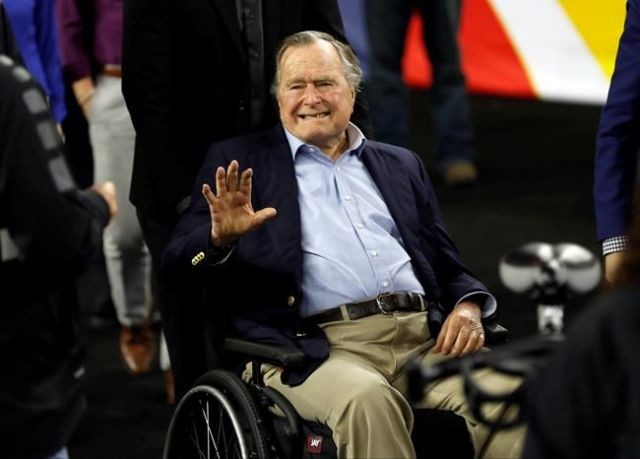George H.W. Bush, a patrician New Englander whose presidency soared with the coalition victory over Iraq in Kuwait, but then plummeted in the throes of a weak economy that led voters to turn him out of office after a single term, has died. He was 94.
The World War II hero, who also presided during the collapse of the Soviet Union and the final months of the Cold War, died late Friday night at his Houston home, said family spokesman Jim McGrath. His wife of more than 70 years, Barbara Bush, died in April 2018.
The son of a senator and father of a president, Bush was the man with the golden resume who rose through the political ranks: from congressman to U.N. ambassador, Republican Party chairman to envoy to China, CIA director to two-term vice-president under the hugely popular Ronald Reagan. The 1991 Gulf War stoked his popularity. But Bush would acknowledge that he had trouble articulating “the vision thing,” and he was haunted by his decision to break a stern, solemn vow he made to voters: “Read my lips. No new taxes.”
He lost his bid for re-election to Bill Clinton in a campaign in which businessman H. Ross Perot took almost 19 per cent of the vote as an independent candidate. Still, he lived to see his son, George W., twice elected to the presidency — only the second father-and-son chief executives, following John Adams and John Quincy Adams.
The 43rd president issued a statement Friday following his father’s death, saying the elder Bush “was a man of the highest character.”
“The entire Bush family is deeply grateful for 41’s life and love, for the compassion of those who have cared and prayed for Dad,” the statement read.
After his 1992 defeat, George H.W. Bush complained that media-created “myths” gave voters a mistaken impression that he did not identify with the lives of ordinary Americans. He decided he lost because he “just wasn’t a good enough communicator.”
Once out of office, Bush was content to remain on the sidelines, except for an occasional speech or paid appearance and visits abroad. He backed Clinton on the North American Free Trade Agreement, which had its genesis during his own presidency. He visited the Middle East, where he was revered for his defence of Kuwait. And he returned to China, where he was welcomed as “an old friend” from his days as the U.S. ambassador there.
He later teamed with Clinton to raise tens of millions of dollars for victims of a 2004 tsunami in the Indian Ocean and Hurricane Katrina, which swamped New Orleans and the Gulf Coast in 2005. During their wide-ranging travels, the political odd couple grew close.
“Who would have thought that I would be working with Bill Clinton, of all people?” Bush quipped in October 2005.
In his post-presidency, Bush’s popularity rebounded with the growth of his reputation as a fundamentally decent and well-meaning leader who, although he was not a stirring orator or a dreamy visionary, was a steadfast humanitarian. Elected officials and celebrities of both parties publicly expressed their fondness.

